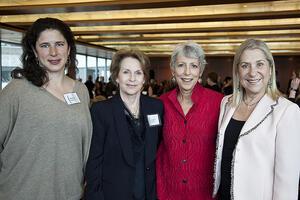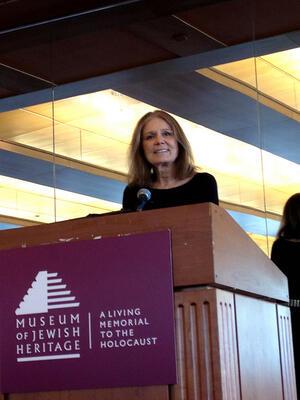Making trouble/making history at JWA's second annual luncheon
Sunday morning, as readers of the New York Times were mulling over a long and thoughtful article about Gloria Steinem's legacy, Steinem herself was with friends and fellow supporters of the Jewish Women's Archive to honor three remarkable Jewish women—Letty Cottin Pogrebin, Elizabeth A. Sackler, and Rebecca Traister — at JWA's second annual Making Trouble/Making History luncheon.
The Times article begins by asking, "Where is the next Gloria Steinem...?" A number of feminist writers and activists, including Steinem, took issue with the question, arguing that the landscape has changed to encourage a diverse "matrix of voices," with "feminism" giving way to "feminisms." As Pogrebin said to the crowd of more than 300 guests at the luncheon, "Who wants a pedestal? It's a very small space."
The program began with JWA founder and Executive Director Gail T. Reimer announcing plans to build upon the online exhibit Jewish Women and the Feminist Revolution to create a more extensive online collection of contemporary women's stories, beginning with artifacts and statements contributed by the 2012 honorees, Pogrebin, Sackler, and Traister.
Reimer then presented the inaugural Natalia Twersky Educator Award, endowed by her late father in memory of her mother, to Allyson Mattanah, a teacher at the Kesher School of Congregation Beit Tikvah in Baltimore, for her outstanding lesson, Who Will You Be: Esthers and Vashtis in the Labor Movement.
Guests enjoyed quiche and yogurt parfait as they screened the world premiere of a new video explaining the vision, mission, and methods of the Jewish Women's Archive.
During lunch, Gloria Steinem presented Making Trouble/Making History Awards to the three honorees.
Steinem called Elizabeth A. Sackler "self-proclaimed 'Matron of the Arts.'" She said, "One of her first undertakings, which brought her international acclaim, was her visionary project to begin the job of return and restitution of Native American ceremonial materials. Liz states of all her work, this repatriation of Native American ceremonial materials came from a sense of connection to her own Jewish history."
Receiving the award, Sackler said, "I have spent the better part of my life making trouble — or conversely, identifying the trouble and making it big trouble to the point of its extinction. This wonderful honor is one of my many rewards, satisfaction, of course, being one of the most delicious." (Read her full remarks here.)
Next, Steinem presented a Making Trouble/Making History Award to Rebecca Traister. "For someone who started her career as a journalist at a time when the market value of a female writer was greatly focused on the interest in her sex life, Rebecca changed that narrowly sexist lens and created for herself a new beat," said Steinem.
In her remarks, Traister spoke directly to the New York Times question of leadership in the contemporary women's movement. "For years, I’ve heard complaints about a younger generation of women — about how they don’t care, how they’re apathetic," said Traister. "But here’s what’s right: Young women have been engaging, working, making trouble, but perhaps in ways that have been invisible to those outside their cohort. I’m here to tell you: thanks to technology and the Internet, young women have been taking control of their own stories, telling them their own ways, getting them right." (Read Traister's full remarks here.)
Finally, Steinem presented a Making Trouble/Making History award to her longtime friend and colleague, Letty Cottin Pogrebin. "Twenty years ago," she recalled, "Letty Cottin Pogrebin helped the Jewish Women’s Archive articulate its mission. 'For a people whose ethos, whose very identity, is founded in remembering,' she wrote in Deborah, Golda, and Me, 'we have forgotten too much about Jewish women. For a community that calls itself the ‘people of the book,’ we have left too many pages blank. The Jewish educational establishment has left us ignorant of Jewish women’s past.'"
Pogrebin talked about Statue of Liberty and the legacy of Emma Lazarus, whose poem the "New Colossus" is inscribed on its base: "From her very first day," Pogrebin said, "she also stood for American women's struggle for freedom and equality ... Maybe," she said, "it's time for women of the world to unite for some serious troublemaking. How about Occupy the Statue of Liberty?" (Read her full remarks here.)
JWA Board member Sue Dorn delivered the closing remarks, driving home the reason why JWA's work matters: "As our country becomes more multi-cultural, the need to know our heritage—and the role women have played and are playing in it—is greater—or it will be lost." (Read her full remarks here.)
Just as it did last year, the program ended with dancing to Debbie Friedman's "Miriam Song," performed by Merri Arian. As I watched guests threading a dance line through the tables, I couldn't help but think that perhaps Gloria Steinem was our Miriam figure, leading us out of bondage in a time when the movement needed a spokeswoman.
But today, in this ambiguous world where "feminism" has given way to "feminisms," we have each become the spokeswomen for our lives and our own, individual struggles for justice and equality. At JWA, we work to uncover, preserve, and share the stories not just of the Great Women but of all Jewish women speaking out, making trouble, and making history.
Links:
Full remarks from all speakers and honorees
Photos from the event on Flickr









Can't wait to have Gloria with us when she's here in Minneapolis in April! www.besyn.org/gloria